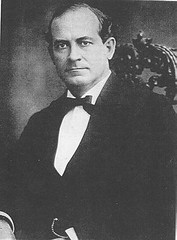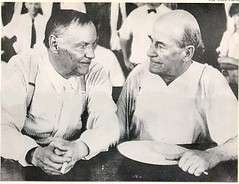 A while ago I posted a picture and some words about Huey P. Long, aka "The Kingfish."
A while ago I posted a picture and some words about Huey P. Long, aka "The Kingfish."
A cousin of mine was in a school production of Inherit the Wind, the drama about the Scopes Trial, sometimes known as the "Monkey Trial," a 1925 extravaganza about the teaching of evolution in the schools also a movie starring Spencer Tracy, Frederic March, and Gene Kelly. The trial brought together H.L.Mencken, who covered the affair as a cynical young reporter for the Bawlmer Sun; Clarence Darrow, the flamboyant Chicago trial lawyer; and William Jennings Bryan, three-time presidential candidate and former Secretary of State.

I was thereby inspired to divagate a bit about Bryan. I've always admired Bryan for two reasons. He was a great orator, in a style that is lost in our electronic age. His most famous speech was the "Cross of Gold" speech that preceded his nomination at the 1896 Democratic Convention. The speech was a masterpiece, and included such choice passages as this:
You come to us and tell us that the great cities are in favor of the gold standard. I tell you that the great cities rest upon these broad and fertile prairies. Burn down your cities and leave our farms, and your cities will spring up again as if by magic. But destroy our farms and the grass will grow in the streets of every city in the country.
And this, which gave the speech its name:
If they dare to come out in the open field and defend the gold standard as a good thing, we shall fight them to the uttermost, having behind us the producing masses of the nation and the world. Having behind us the commercial interests and the laboring interests and all the toiling masses, we shall answer their demands for a gold standard by saying to them, you shall not press down upon the brow of labor this crown of thorns. You shall not crucify mankind upon a cross of gold.
Bryan's finest hour was his resignation, on principle, as the nefarious Woodrow Wilson's Secretary of State, because Wilson, having run for reelection on the slogan "He kept us out of war," promptly began maneuvering to get us into World War I.
Bryan was known as "The Great Commoner," and was a legend and a hero in the farming communities, squeezed between the banks and the railroads. Vachel Lindsay wrote of this:
I brag and chant of Bryan, Bryan, Bryan
Candidate for president who sketched a silver Zion,
The one American Poet who could sing outdoors,
He brought in tides of wonder, of unprecedented splendor,
Wild roses from the plains, that made hearts tender,
All the funny circus silks
Of politics unfurled,
Bartlett pears of romance that were honey at the cores,
And torchlights down the street, to the end of the world.
There were truths eternal in the gab and tittle-tattle.
There were real heads broken in the fustian and the rattle.
There were real lines drawn:
Not the silver and the gold,
But Nebraska's cry went eastward against the dour and old,
The mean and cold.
There's more about the Scopes Trial in a fine series of pages here. The "Inherit the Wind" version, although it does not make Bryan entirely unsympathetic, takes dramatic licenses and is a but unfair to Bryan.
What's fascinating about all of this is that although the issues and symbols have changed, there's nothing new about the "red state"-"blue state' dichotomy, or the culture wars that go with it. Bryan, a flawed man, was nevertheless a giant, and quintessentially American. We should not forget him.

No comments:
Post a Comment